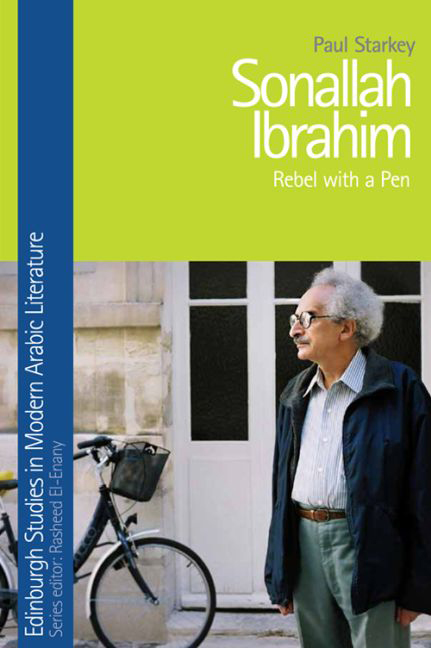Book contents
- Frontmatter
- Contents
- Series Editor's Foreword
- Preface
- 1 Introduction: Background and Context
- 2 Rebel with a Pen
- 3 Cairo Prison: Tilka al-raʾiha (1966)
- 4 Michelangelo and the Dam: Najmat Aghustus (1974)
- 5 CocaColaland: al-Lajna (1981)
- 6 War in Lebanon: Bayrut, Bayrut (1984)
- 7 Consumer Society: Dhat (1992)
- 8 Prison of Dishonour: Sharaf (1997)
- 9 Widening Horizons (1): Sex, Memory and Revolution: Warda (2000)
- 10 Widening Horizons (2): In the Land of the Capitalists: Amrikanli (Amri Kan Li) (2003)
- 11 Return to Childhood: al-Talassus (2007)
- 12 The French Connection: al-ʿImama wa-al-Qubbaʿa (2008) and al-Qanun al-Faransi (2008)
- 13 Filling a Gap: al-Jalid (2011)
- 14 Epilogue
- Bibliography
- Index
Preface
Published online by Cambridge University Press: 23 September 2017
- Frontmatter
- Contents
- Series Editor's Foreword
- Preface
- 1 Introduction: Background and Context
- 2 Rebel with a Pen
- 3 Cairo Prison: Tilka al-raʾiha (1966)
- 4 Michelangelo and the Dam: Najmat Aghustus (1974)
- 5 CocaColaland: al-Lajna (1981)
- 6 War in Lebanon: Bayrut, Bayrut (1984)
- 7 Consumer Society: Dhat (1992)
- 8 Prison of Dishonour: Sharaf (1997)
- 9 Widening Horizons (1): Sex, Memory and Revolution: Warda (2000)
- 10 Widening Horizons (2): In the Land of the Capitalists: Amrikanli (Amri Kan Li) (2003)
- 11 Return to Childhood: al-Talassus (2007)
- 12 The French Connection: al-ʿImama wa-al-Qubbaʿa (2008) and al-Qanun al-Faransi (2008)
- 13 Filling a Gap: al-Jalid (2011)
- 14 Epilogue
- Bibliography
- Index
Summary
This book is designed as an introduction to the novels of Sonallah Ibrahim, widely regarded as one of Egypt's, and the Arab world's, most distinguished and distinctive contemporary writers, and a pioneer of the new mood that began to dominate the Arab cultural environment from the mid-1960s onwards. Although there are several articles and book chapters in English devoted to Sonallah Ibrahim's works, to my knowledge there is no comprehensive study of his novels as a whole in English (or in any other language, for that matter), and the present work is therefore intended to fill an important gap. It should be noted that the work does not attempt to cover Sonallah Ibrahim's other varied literary activities – which include short stories (though this is not a genre to which the author has made any significant contribution), writing for children, translations, and non-fictional writing, except where (as is the case with his prison diaries, for example) they are directly and obviously relevant to a discussion of the novels themselves.
Sonallah Ibrahim's novelistic output, which spans over forty-five years, represents a unique contribution to modern Egyptian literature, as well as to Arabic literature more generally, being almost always closely related in some way or other to the social, political or historical development either of Egypt or of some other region of the Arab world. A reading of Ibrahim's novels will therefore serve as an introduction not only to the development of Arabic literature over the last half-century or so but also to certain trends in the historical and political development of modern Egypt and elsewhere in the Middle East, as viewed from the author's personal perspective, which is consistently Marxist and anti-capitalist in tone.
In discussing the novels, I have tried where possible to relate the themes of the works to contemporary political or historical developments, while at the same time exploring the literary techniques – for example, the use of ‘intertextual’ devices – which run like a thread through the novels from Tilka al-raʾiha (1966) onwards, and which have been developed and refined through the author's long career. In terms of literary theory, I have deliberately kept my account ‘light’; some use has been made of the analytical framework provided by Gérard Genette when discussing the evolution of Sonallah Ibrahim's often innovative narrative techniques, but this is not the primary focus of the present study.
- Type
- Chapter
- Information
- Sonallah IbrahimRebel with a Pen, pp. x - xiiPublisher: Edinburgh University PressPrint publication year: 2016



